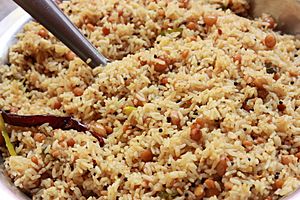Pulihora facts for kids
 |
|
| Place of origin | India |
|---|---|
| Region or state | South India |
| Main ingredients | Rice, Kokum or Tamarind |
| Variations | Kokum, Ambula (dried green mago), tamarind, lemon, lime, citron, onion |
Pulihora is a very popular and traditional rice dish from South India. It's also known by other names like puliyogare, puliyodarai, pulinchoru, or simply lemon or tamarind rice. You can find it in states like Telangana, Andhra Pradesh, Karnataka, Kerala, and Tamil Nadu.
The word "Puli" means 'tangy' or 'sour' in South Indian languages. This name comes from the main ingredients used to make the dish taste sour, which are usually kokum or tamarind.
How Pulihora is Made
Pulihora is prepared using cooked rice mixed with a special paste. This paste gets its sour taste from ingredients like kokum, tamarind, lemon, or even green mango.
The paste also includes a mix of spices, lentils, and peanuts. These are cooked in oil along with jaggery (a type of unrefined sugar) and fried curry leaves. All these ingredients are then mixed with the cooked rice.
One cool thing about Pulihora is that it stays fresh for up to two days. This makes it a great meal for people traveling long distances in South India.
Pulihora Paste and Powder
Sometimes, people in South India make a special paste called Pulihora gojju or a powder called Pulihora podi ahead of time. They can store this paste or powder for many months! When they want to make Pulihora, they just mix it with freshly cooked rice. This makes it super quick and easy to prepare.
Why Pulihora is Special
Pulihora is often made for special events and festive days. It's not just a meal; it also has a special meaning. In many South Indian temples and homes, Pulihora is offered to God as part of prayers. This special offering is called prasadam.
After prayers, people who visit the temples often line up to receive this prasadam. It's a way for them to share in the blessings.
See also
 In Spanish: Pulihora para niños
In Spanish: Pulihora para niños
 | Isaac Myers |
 | D. Hamilton Jackson |
 | A. Philip Randolph |

